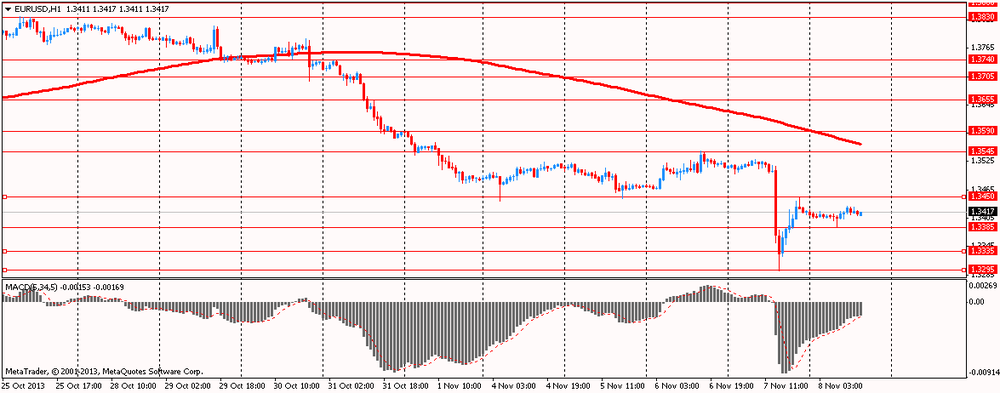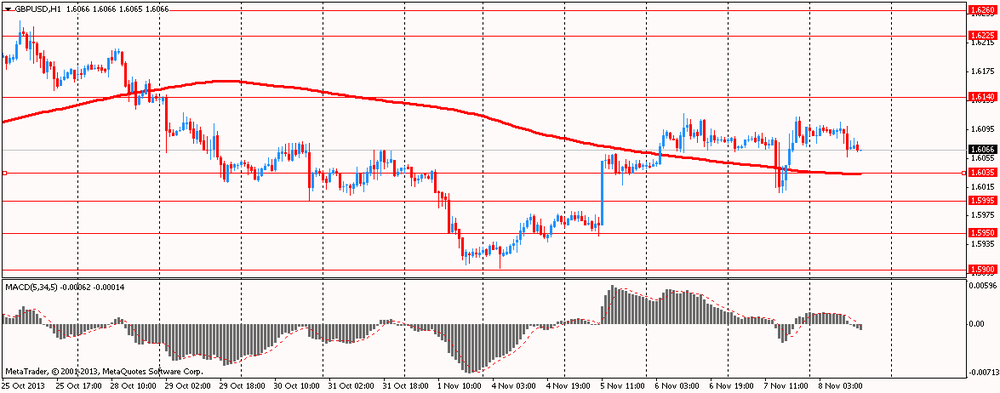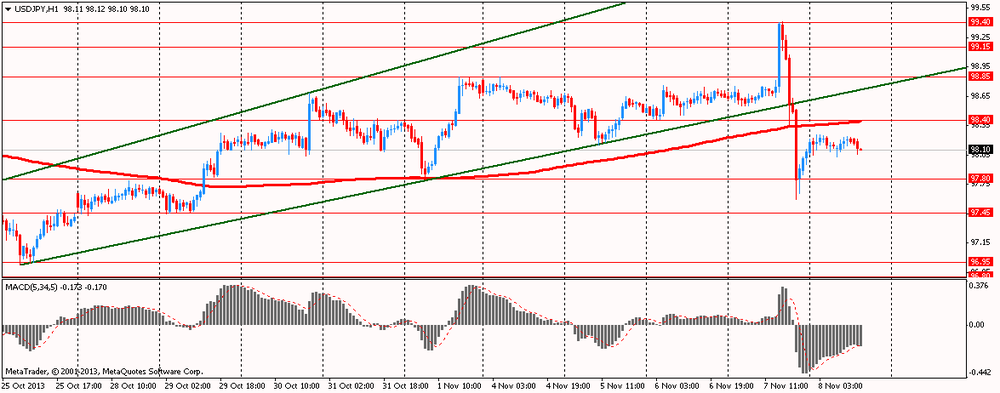- European session: the euro rose
Market news
European session: the euro rose
06:45 Switzerland Unemployment Rate October 3.2% 3.2% 3.2%
07:00 Germany Current Account September 9.4 15.0 19.7
07:00 Germany Trade Balance September 15.8 Revised From 15.6 17.2 18.8
07:45 France Industrial Production, m/m September +0.7% Revised From +0.2% +0.4% -0.5%
07:45 France Industrial Production, y/y September -2.9% -1.3% -0.9%
08:15 Switzerland Retail Sales Y/Y September +2.4% +2.6% +1.0%
09:30 United Kingdom Trade in goods September -9.6 -9.2 -9.8
At the beginning of the session the pressure on the euro had a decrease in agency Standard & Poor's credit rating of France. The agency noted the slowdown in growth, which will limit the ability of the government to improve public finances and reduce the impact of the reforms undertaken by President Francois Hollande .
Long-term rating in foreign and national currency was lowered one step to AA from AA + . France lost its top rating in January 2012 . The rating outlook at this stage (the third from the top) is stable , said S & P. The downgrade emphasizes that the second largest economy in Europe is trying to recover from the financial crisis and recession. Hollande could not stop the decline in the competitiveness of France through changes in labor laws and payroll taxes , the European Commission said in its report on November 5.
" The downgrade reflects our opinion that the current approach to the French government's fiscal and structural reforms of taxation is unlikely to significantly increase the medium-term growth prospects in France ," - said the S & P today .
In addition, the negative impact on the dynamics of the euro affected the data on industrial production in France . Industrial production fell by 0.9 percent year on year in September. Economists' forecasts were at 1.3 -percent decline. The rate of decline was slower than the 2.9 percent cuts that were recorded in August. Industrial production fell by 0.5 percent compared to August , when it was recorded an increase of 0.7 percent. Expectations were for a 0.4 percent monthly gain. In the third quarter, industrial production fell by 1.4 percent from the previous three-month period and showed a similar decline as compared to the third quarter of 2012.
In manufacturing output fell by 1.3 percent in August compared with a year earlier, faster than the 1.1 percent decline that economists had forecast . On a monthly measurement of industrial production fell by 0.7 percent in September after a 0.9 percent increase the previous month. Economists had expected an increase of 0.4 percent.
Later, the euro recovered some lost positions against the U.S. dollar, but to develop the upward momentum and could not . Market participants are waiting for data on the U.S. labor market .
The British pound fell against the dollar on fears that the UK economy is in the 3rd quarter, probably grew less than initially predicted. This is indicated by official data on the trade deficit and the construction sector , published on Friday .
Decrease in activity in the construction sector by 0.9 % in September compared with August, means that in the 3rd quarter of the sector expanded by 1.7 %, while the originally reported growth of 2.5%. That's enough to reduce overall economic growth by 0.04 percentage points.
Weak data on foreign trade deficit , including a record decline in exports to the other countries of the European Union in September , also will damage economic growth in the 3rd quarter, reported by the National Bureau of Statistics .
The data was worse than expected , apart from the slight improvement of data on industry in the 3rd quarter.
Exports of goods decreased by 4.6 % in the 3rd quarter, which was the largest quarterly decline since the 1st quarter of 2009, when the country was in a global financial crisis.
EUR / USD: during the European session, the pair fell to $ 1.3388 , and then rose to $ 1.3431
GBP / USD: during the European session, the pair fell to $ 1.6057
USD / JPY: during the European session, the pair fell to Y98.03
At 13:15 GMT Canada will release a number of Housing Starts , unemployment rates, changes in the number of employees, change in the number of full-time , changing the number of part-time employees in October. In the U.S., at 13:30 GMT will the unemployment rate , change in the number of employed in non-agricultural sector , changes in the number of employees in the private sector of the economy , changes in the number of employees in the manufacturing sector of the economy, change in average hourly wages , the total revision of employment for 2 months in October , the main index for personal consumption expenditures , changes in the level of spending, deflator of personal consumption expenditures for September, at 14:55 GMT - the index of consumer sentiment from the University of Michigan in November at 15:00 GMT - the level of vacancies and labor turnover from the Bureau of Statistics work in September. At 20:30 GMT a speech Fed chairman Ben Bernanke.


